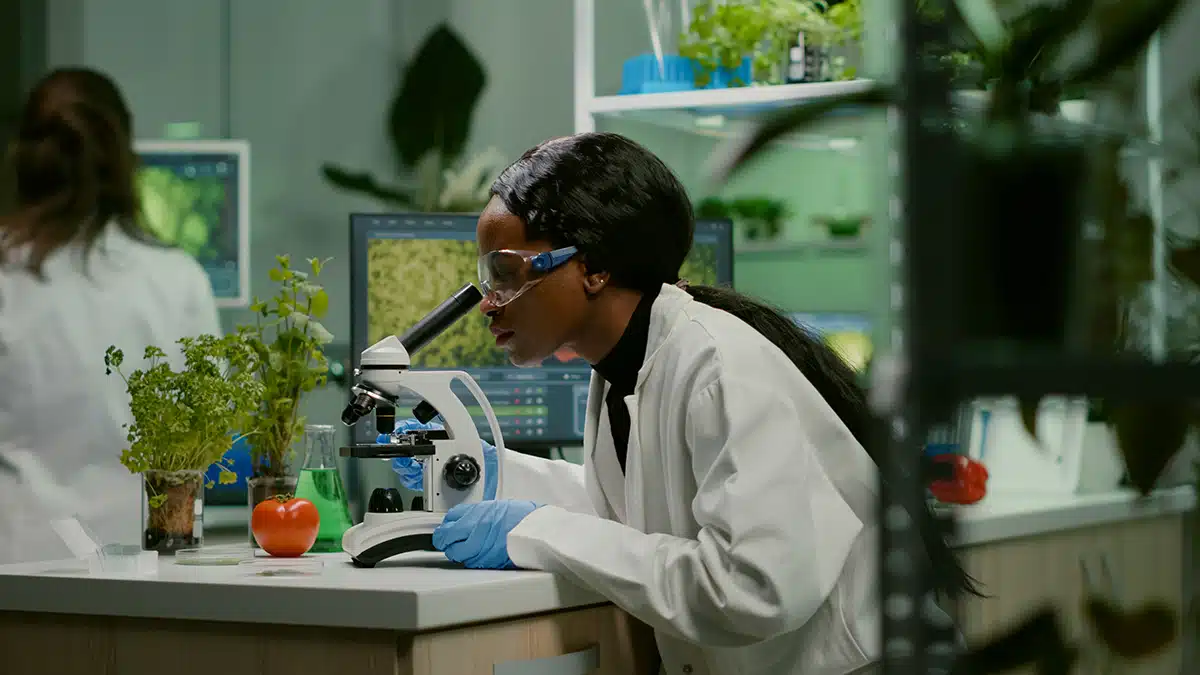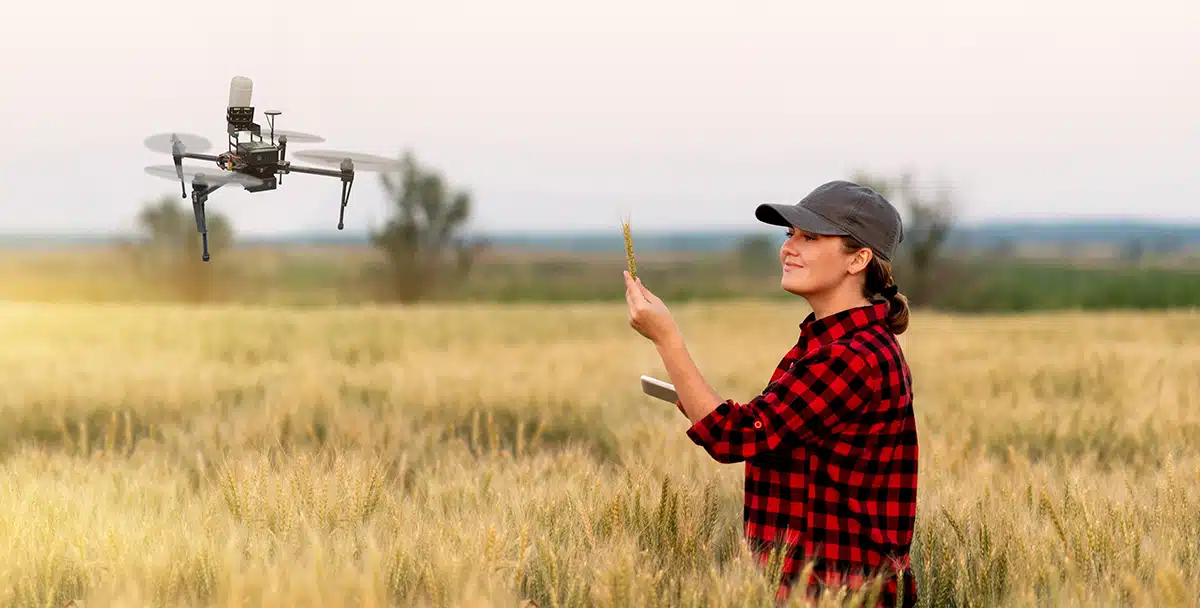What comes to mind when you think about an agriculture career? I’m guessing farms, gardens, and livestock management are at the top of your list. But agriculture careers are much more than caring for plants and animals.
In this blog, I break down five agriculture careers that may surprise you. I share what the career path might entail, how it aligns with career interests, and what the trends are in each field.
I also highlight one suggested path to create stackable credentials with industry-recognized certifications from Precision Exams by YouScience to help you build certifications toward each agriculture career – one of the many benefits of purchasing a full certification site license.
Agriculture career #1 – athletic turf manager
Football season is in full swing, but how do stadiums and arenas keep their turf looking nice week after week? Well, that’s someone’s job!
As you might imagine, athletic turf managers are responsible for developing and implementing plans that ensure all athletic fields and grounds are kept in pristine condition year-round.
But that’s not all they’re managing.
They’re also key players in maintaining schedules for field use, overseeing maintenance crews, and making decisions on when changes are needed.
I think it goes without saying that this agriculture career path could be a sports lover’s paradise, but, in general. it’s ideal for someone who is interested in careers that are:
-
-
- Enterprising
With ample opportunities to flex your skills as a leader, athletic turf managers’ responsibilities frequently involve planning, overseeing, and managing a wide array of projects and people. - Realistic
This career lets you work outside (for the most part) while making practical decisions on what problems to solve next – whether you’re repairing irrigation systems or restoring fields after an event. - Conventional
From equipment inventories to supervising events, you’ll enjoy being able to follow a routine set of procedures to meet your goals and accomplish necessary tasks.
- Enterprising
-
Find out if you’re enterprising, realistic, and/or conventional by taking YouScience Discovery.
How do I get there?
Most athletic turf managers have a bachelor’s degree in agriculture, business, plant sciences, or a related field, but it’s possible to become one with a high school diploma or GED. Many managers have experience as an assistant superintendent or in a professional internship program before becoming a turf manager.
Job trends (via O*Net Online):
-
-
- Median wage (2020): $51,010 annually
- Projected job openings (2019–2029): 18,900
-
Build it with stackable credentials
You’ll want to start your path to athletic turf manager by getting a solid foundation in agriculture with the Plant and Soil Science I certification exam. This program gives you a better understanding of agriculture’s history in civilization and how plants play an important role in everyday life. You’ll explore soil science concepts and plant anatomy, and even get a crash course on horticulture for both food and ornamental production.
With this foundational knowledge under your belt, set your sights on the Landscape Management certification exam. In this program, you’ll build a foundation in landscape design, best practices for plant installation and maintenance (including turfgrass), and methods for pest management. You’ll also learn about irrigation systems and how to maintain and operate landscape equipment.
Leadership skills are essential in most careers, but they’re especially important if you want to rise in the ranks to become a successful athletic turf manager. Getting the Leadership Principles I certification exam under your belt will get you a step ahead by helping you build skills in setting goals, managing time, communicating effectively, and making decisions.
Agriculture career #2 – grain marketing specialist
Believe it or not… grain doesn’t sell itself.
Grain marketing specialists are behind the scenes strategizing when to buy grain, determining how long to store or process it, and deciding when the market says it’s time to sell.
They have a finger on the pulse of agriculture trends to optimize their businesses while working to manage and mitigate potential risks.
It’s an ideal agriculture career path for someone who is interested in careers that are:
-
-
- Enterprising
Grain marketing specialists often start and carry out projects, strategize and make decisions, take occasional risks, and communicate frequently with vendors, customers, and staff. - Conventional
You’ll work with data and details to create sales plans to maintain and increase customer volumes, ensure schedules and stocks are maintained, and track market trends to keep business on course. - Realistic
If you like practical, hands-on problems and solutions, this career may let you interview vendors and visit their plants and distribution centers to examine and learn about products, services, and prices.
- Enterprising
-
Find out if you’re enterprising, realistic, and/or conventional by taking YouScience Discovery.
How do I get there?
Most grain marketing specialists have a bachelor’s degree and/or licensure in agriculture science, business, finance, or a related field. Some also have hands-on experience working at a grain elevator, processor, or feeder.
Job trends (via O*Net Online):
-
-
- Median wage (2020): $66,690 annually
- Projected job openings (2019-2029): 36,000
-
Build it with stackable credentials
To effectively sell any product, you need a basic understanding of what you’re selling, which is why YouScience recommends starting out with the Agricultural Science I certification exam. Think of it as a crash course in agricultural science and agribusiness to help you build the foundational agricultural literacy you’ll need to succeed.
Because this career involves frequent communication with internal and external stakeholders, consider taking the Business Communication I certification exam. You’ll gain the skills necessary to effectively communicate in a clear, courteous, concise, complete, and correct manner on both personal and professional levels.
Of course, you’ll want to get the Marketing I certification exam under your belt too. This program introduces the seven core functions of marketing with hands-on applications and projects – from making a marketing plan to effectively making sales to customers – to help you put your best foot forward as a grain marketing specialist.
Agriculture career #3 – food technologist
If you’re a food-lover, you can get on the front lines of food safety and production as a food technologist.
It’s an important agriculture career that ensures food products are produced safely, legally, and to the highest quality. Food technologists develop everything from innovative ideas to refine the manufacturing process to new or updated recipes for food and drink products.
There are opportunities in all aspects of the food industry for them to step in and support or improve processes.
This might be for you if you’re interested in careers that are:
-
-
- Investigative
Brainstormers rejoice! A food technologist’s tasks frequently involve working with ideas, data, and facts to solve problems, and may even offer the opportunity for conducting surveys and researching market trends. - Realistic
From developing new foods, flavors, and colors, to managing production and quality control, you’ll be dealing with practical problems and solutions in this career. - Conventional
Processes and routines are the name of the game in this career, as you’ll likely spend much of your time studying data and reports in a laboratory or an office.
- Investigative
-
Find out if you’re investigative, realistic, and/or conventional by taking YouScience Discovery.
How do I get there?
Most food technologists hold a bachelor’s degree or higher in agricultural science, food technology, chemistry, or a related field. They typically have gained hands-on experience through internships and research opportunities prior to graduating and landing a job.
Job trends (via O*Net Online):
-
-
- Median wage (2020): $73,450 annually
- Projected job openings (2019-2029): 1,400
-
Build it with stackable credentials
Every great food technologist needs a foundation in the basics, which is why you want to take the Food and Nutrition I certification exam for starters. This program focuses on the science of, well, food and nutrition with special focuses on introducing the concepts of food safety and sanitation, culinary technology, food preparation, and dietary analysis to develop a healthy lifestyle.
Whether you’re in a laboratory or an office, you’ll want to get the Computer Science Principles certification exam on your resume to show potential employers you’re adept with computers and data. You’ll be analyzing lots of data in this career path, so this program will give you insights into developing algorithms and programs to solve problems.
You can show you have a well-rounded knowledge of agriculture and the ability to adapt to emerging fields with the Biotechnology certification exam. You’ll gain knowledge of the history of biotechnology and its applications, become equipped with laboratory safety procedures, and explore atoms, molecules, reagents, cells, bacteria and beyond – all of which can help you become an even better food technologist!
Agriculture career #4 – precision agriculture specialist
GPS and robots and sensors, oh my!
Precision agriculture specialists use technology to make the practice of farming more accurate and controlled, while ensuring profitability, efficiency, and sustainability.
They use mapping equipment and software, global positioning systems, and satellite equipment, to name a few, to support farmers with their crops and livestock.
Some precision agriculture specialists also install, optimize, and repair equipment, and serve as a sales representative to grow a company’s client base.
It’s the ideal agriculture career for someone interested in fields that are:
-
-
- Realistic
You can enjoy working with your hands as a precision agriculture specialist as you calibrate equipment, prepare maps of properties, and even collect data in the field to show real results on products and crop yields. - Investigative
If you like data, you’ll enjoy working with everything from satellite data to soil sample results to provide farmers with real-time recommendations to help their farms flourish. - Conventional
This career involves many set routines that are dictated by the climate and seasons where you’re working. Just as the farmers turn their crops for the seasons, so will you with your recommendations.
- Realistic
-
Find out if you’re investigative, realistic, and/or conventional by taking YouScience Discovery.
How do I get there?
Most precision agriculture specialists hold a bachelor’s degree or higher in agricultural technologies, agronomy, agricultural business, or a related field. Many will also have experience in sales to support with building and maintaining customer relationships.
Job trends (via O*Net Online):
-
-
- Median wage (2020): $41,970 annually
- Projected job openings (2019-2029): 2,800
-
Build it with Stackable Credentials
If you want to become a precision agriculture specialist, start with the Agricultural Systems and Technology I certification exam. This program gives you a solid foundational understanding of the power, structural, and technical systems used in the agricultural industry with a focus on agricultural production and service. You’ll get hands-on skills in hot and cold metal work, plumbing, painting, engine repair, and even welding.
Because this career path involves new and emerging technologies, it’s also helpful to get the fundamentals of computer programming under your belt. The Computer Programming I certification exam will give you the skills to design, code, and test your own programs while applying mathematical concepts. You’ll even be introduced to programming language, such as C++, C#, Java, Python, and JavaScript.
You’ll be working closely with customers in this field, which is why YouScience recommends including the Customer Service certification exam in your career plan. You’ll learn to develop strategies for working with customers – from helping them make decisions to resolving their concerns or issues. These skills are critical in improving customer satisfaction and retention as a precision agriculture specialist.
Agriculture career #5 – hydraulic technician
From tractors to harvesters, there are a lot of big vehicles on the farm that need to be ready to go into action each season, but what happens when one breaks down? You call in a hydraulic technician, of course!
With their expertise in hydraulic systems, hydraulic technicians are critical to keeping farm operations running smoothly. They are responsible for everything from troubleshooting and diagnosing problems to conducting preventative maintenance to avoid system failures.
Hydraulic technicians use tools to take things apart and put them back together again and may even be responsible for reading and drawing schematics for customers.
It’s ideal for someone interested in agriculture careers that are:
-
-
- Realistic
As a hydraulic technician, you’ll have ample opportunities to work with your hands to inspect, troubleshoot and repair equipment and machinery, using your knowledge of hydraulics to keep operations running smoothly. - Conventional
You’ll need to know the equipment and machinery you’re working with inside and out with this career. With that, you’ll carry the knowledge and skills to follow the steps needed to make repairs, replace components, and ensure optimal performance.
- Realistic
-
Find out if you’re realistic and/or conventional by taking YouScience Discovery.
How do I get there?
Most hydraulic engineers have a high school diploma, GED, or an associates degree in fluid mechanics, hydraulic technology, or a related field. Many have experience as a mechanic, maintenance technician, or welder, and some even have experience operating heavy machinery.
Job trends (via O*Net Online):
-
-
- Median wage (2020): $55,350 annually
- Projected job openings (2019-2029): 13,700
-
Build it with stackable credentials
Although you’ll need to get the Agricultural Systems and Technology I and Agricultural Systems and Technology II certifications under your belt first, the Agricultural Machinery Technology certification exam will serve as a sweet reward for your hard work. This rigorous, hands-on program will leave you feeling better prepared to repair, maintain, and restore agricultural machinery and equipment in a safe manner.
Since much of the machinery used in agriculture is made of metal, plan to pursue the Welding Technician I certification exam. You’ll learn about the different welding processes and procedures, gain an understanding of the safety precautions you need to take, and learn to read and interpret welding blueprints. Plus, you’ll get first-hand experience with different welding processes to help along the way.
Much of the machinery on farms involves computers in some way and getting the Computer Systems I certification exam can put you at an advantage. By gaining the necessary competencies for entry-level IT professionals, you’ll be ready to tackle any computer-based problem that comes your way as a hydraulic technician – from troubleshooting and diagnosing problems to upgrading and repairing systems.
So, what do you think? I hope this inspires you to expand your thinking on the possibilities of agriculture careers and how one might fit your talents to a tee.
To find out whether your aptitude for spatial visualization makes you the next Tony Stark, or another job that will make you just as successful, try YouScience Aptitude & Career Discovery for yourself.
Talk to us how YouScience Brightpath is revolutionizing how individuals, education, and industries connect and succeed.











